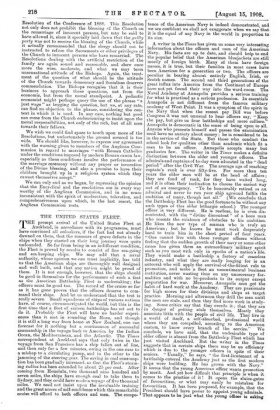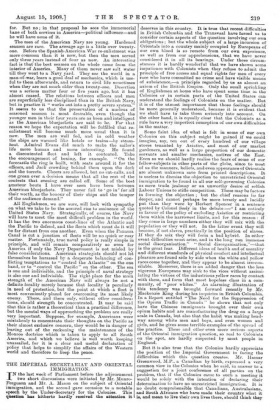THE 1J1(ITED STATES FLEET. T HE prompt arrival of the United
States Fleet at Auckland, in accordauce with its programme, must have convinced all onlookers, if the fact had not already dawned on them, that the rumours of grave defects in the ships when they started on their long journey were quite unfounded. So far from being in an indifferent condition, the Fleet is proved by results to consist of fine sea-going and sea-keeping ships. We may add that a naval authority, whose opinion we can trust implicitly, has told us that the American ships are thoroughly well designed and well built, and that any nation might be proud of them. It is not enough, however, that the ships should be good in themselves for the performance of such a feat as the American Battleship Fleet is undertaking ; the officers must be good too. The record of the cruise so far as it has gone proves that the officers deserve to com- mand their ships. And let us understand that the test is really severe. Small squadrons of ships of various nations have, of course, circumnavigated the world, but this is the first time that a fleet of sixteen battleships has set out to do it. Probably the Fleet will have no harder experi- ences than it met in rounding the Horn, and though it is still a long way from home at New Zealand, one can forecast for it nothing but a continuance of successful seamanship in the voyage back to America by the Indian Ocean, the Mediterranean, and the Atlantic. The Times correspondent at Auckland says that only twice in the voyage from San Francisco has a ship fallen out of line, and then only for a few minutes, owing in the one case to a mishap to a circulating pump, and in the other to the jamming of the steering gear. The saving in coal consump- tion has been gradually increased, so that the Fleet's steam- ing radius has been extended by about 25 per cent. After coming from Honolulu, two thousand nine hundred and seven miles, the ships have enough coal to take them to Sydney, and they could have made a. voyage of five thousand miles. We need not insist upon the invaluable training and the great access of self-confidence which this remarkable cruise will afford to both officers and men. The compe- tence of the American Navy is indeed demonstrated; and we are confident we shall not exaggerate when we say that it is the equal of any Navy in the world in proportion to its size.
A writer in the Times has given us some very interesting information about the officers and men of the American Navy. His facts are up to date, and should help to end the popular belief that the American bluejackets are still mostly of foreign birth. Many of them have foreign names, it is true, but their families in most cases have been American for a generation or two. The officers are peculiar in bearing almost entirely English, Irish, or Scotch names. The second and third generations of the great influx into America from the Continent of Europe have not yet found their way into the ward-room. The Naval Academy at Annapolis provides a serious training for what is practised as a serious profession. In essentials Annapolis is not different from the famous military academy of West Point. It was a symptom of the spirit in the Navy that when the recent pay Bill was before Congress it was not unusual to hear officers say, "Keep the pay, but give us four battleships and more colliers." Annapolis is democratic in the sense of being open to all. Anyone who presents himself and passes the examination need have no anxiety about money ; he is considered to be in the service of the State. But those who conduct the school look for qualities other than academic which fit a man to be an officer. Annapolis accepts many but graduates few. The writer in the Times makes a definite distinction between the older and younger officers. The admirals and captains of to-day were educated in the "dead period" after the Civil War. The average age of reaching captain's rank is over fifty-five. For more than ten years the older men will be at the head of affairs ; they are fond of rank, for they have waited long, and it is often their inclination to choose the easiest way out of an emergency. "To be honourably retired as an admiral and never to run your ship aground fulfils the ambition of many, though not all.' (We conclude that the Battleship Fleet has the good fortune to be without any such types of this older lethargic school.) The younger officer is very different. He is restless, he is even dis- contented, with the "divine discontent" of a keen man who resents the existence of obstacles to his ambition. He likes the new type of seaman who is truly an American; but he knows he must work desperately hard to train him in the short period of four years. "One cannot live with these younger officers without feeling that the sudden growth of their navy or some other cause has given them an extraordinary military spirit such as you meet with only in epochs of a nation's life. They would make a battleship a factory of ceaseless industry, and what they are really longing for is an autocrat who will apply the survival-of-the-fittest rule to promotion, and make a fleet an unsentimental business institution, never wasting time on any unnecessary for- malities and with no by-products to its output except preparation for war. Moreover, Annapolis men get the habit of hard work at the Academy. They are passionate for high scores for their divisions and ships at target practice. Morning and afternoon they drill the men until the men are stale, and then they find more work in study- ing. Some critics say that they overdo it ; that they are in danger of getting stale themselves. Mostly they associate little with the people of civil life. They live in a world of itself, a self-absorbed, professional world where they are compelled, according to the American custom, to know every branch of the service." We conclude, we have said, that the undesirable type of older officer is absent from the Battleship Fleet which has just visited Auckland. But the writer in the Times suggests that in certain ships there may be an efficiency which is due to the younger officers in spite of their seniors. "Usually," he says, "the first-lieutenant of a battleship entered the Academy just as the first modern ships were building. He has grown with the Navy." It seems that the young American officer wants promotion by merit. And yet how difficult that principle is when it comes to the practice of it ! It opens the sluice-gates of favouritism, or what may easily be mistaken for favouritism. It has been proposed, for example, that the President should have power to appoint young admirals. That appears to be just what the young offioer is asking for. But no; in that proposal he sees the immemorial bane of both services in America—political influence—and he will have none of it.
The men of the American Navy are young. Hardened seamen are rare. The average age is a little over twenty- one. Before the Spanish-American War re-enlistment was more common than it is now, but then the men served only three years instead of four as now. An interesting fact is that the best seamen on the whole come from the interior of America. Many of them never saw salt water till they went to a Navy yard. They see the world in a man-of-war, learn a good deal of mechanics, which is use- ful to them afterwards, and return to civil life sometimes when they are not much older than twenty-one. Desertion was a serious matter four or five years ago, but it has almost ceased. The relations between officers and men are superficially less disciplined than in the British Navy, but in practice it "works out into a pretty severe system." It seems to us that the preservation of a nucleus of seasoned seamen is most desirable, even though the younger men in their four years are as keen and intelligent as the American bluejackets are said to be. For that reason we hope the expectation will be. fulfilled that re- enlistment will become much more usual than it is now. The men are well fed, and in cold weather the ships are warmed like hotels or trains—by steam- heat. Admiral Evans did much to make the sailor's life more human and more interesting. He found a discontented fleet and left it contented. Take the encouragement of boxing, for example. "On the forecastle the ring is built, with seats around it for the officers, and Jack crowding behind them upon the deck and the turrets. Cheers are allowed, but no cat-calls, and one groan over a decision means that all the rest of the contests that evening are called off. Some of the best amateur bouts I have ever seen have been between American bluejackets. They never fail to 'go in' for all their worth, as the honour of their ships and the temper of the audience demand."
All Englishmen, we are sure, will look with sympathy on what we take to be the assured rise to eminence of the United States Navy. Strategically, of course, the Navy will have to meet the most difficult problem in the world. It has the two enormous coast-lines of the Atlantic and the Pacific to defend, and the fleets which must do it will be far distant from one another. Even when the Panama Canal is cut a junction of fleets will be no quick or easy matter. Fortunately, true naval policy is really simple in principle, and will remain comparatively so even for America if only the Navy Department is not misled by false considerations. American strategists should not let themselves be harassed by a desperate balancing of con- flicting temptations to "control the Atlantic" on the one hand, or to "control the Pacific" on the other. The sea is one and indivisible, and the principle of naval strategy is also one and indivisible. The right place for the main strength of the American Navy will always be not a definite locality merely because that locality is peculiarly in need of protection, but the point at which a fleet is most conveniently placed for overcoming its most likely enemy. There, and there only, without other considera- tions, should strength be concentrated. It may be said that this is rather a theoretical than a practical difference, but the mental ways of approaching the problem are really very important. Suppose, for example, Americans were mistakenly to concentrate their thoughts on the Pacific as their almost exclusive concern, they would be in danger of leaving out of the reckoning the maintenance of the Monroe doctrine which is taken to apply to all South America, and which we believe is well worth keeping unassailed, for it is a clear and useful declaration of policy that helps to simplify the affairs of the Western world and therefore to keep the peace.







































 Previous page
Previous page